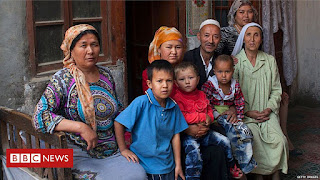China Genocide = “Re-Education” Camps?
Who are the Uyghurs?
The Uyghurs are a Turkic ethnic group originating and culturally unified from the Central and East Asia region. The Uyghurs are recognized as native to the Xinjiang Region in Northwest China. There are about 12 million Uyghurs, mostly Muslim, living in Xinjiang and they speak their own language. There's been a huge migration of the Chinese ethnic majority group into Xinjiang, allegedly pointed by the state to push down the minority residents in the region. Many Uyghur activists are worried about the group's culture, and how it could be under a major threat of elimination. The Uyghurs group have no religious rights and believe their ancestors were indigenous to the area, relating to the crimes that are being done to these groups of humans.

Committing Crimes Against Humanity
Human rights groups believe China has confined one million-plus Uyghurs against their drive over the last few years in a large network of what the state calls "re-education camps". There has been evidence that the Uyghurs are also being used as forced labor, while also being tortured and sexually abused. These disgraceful humans are creating specific jobs, including step-by-step procedures to remove clothes from women and make sure they cannot move. The BBC
interviewed a woman from Xinjiang who was detained for 18 months in the camp system. "My job was to remove their clothes above the waist and handcuff them so they cannot move," said Gulzira Auelkhan, crossing her wrists behind her head to demonstrate. "Then I would leave the women in the room and a man would enter - some Chinese man from outside. I sat silently next to the door, and when the man left the room I took the woman for a shower." (BBC News: Matthew Hill, David Campanale and Joel Gunter) To add to this sickening situation, Auelkhan also stated that the Chinese men "would pay money to have their pick of the prettiest young inmates" (BBC News: Matthew Hill, David Campanale, and Joel Gunter).

Experts say Xinjiang has switched over to more of a surveillance state that counts on innovative technology to look over all of the people in the community. Different parts of Xinjiang are split into these so-called “squares” and most of these cities have a police station every 100 yards. The public security in Xinjiang almost tripled from 2016 to 2017. In 2016, there was a total of a little over 30,000 job advertisements for security, while in 2017, it jumped to almost 80,000. There are leading human rights groups like Amnesty and Human Rights Watch, who have presented reports going against China, emphasizing their crime against humanity. China continues to deny all of the allegations of human rights abuses. China states the clampdown in Xinjiang is necessary to avert terrorism and the camps are an effective instrument for re-educating inmates. Now there is a new report titled “China forcing birth control on Uyghurs to suppress the population.” Hmmm, wonder why?!

 https://www.cfr.org/backgrounder/chinas-repression-uyghurs-xinjiang https://www.cnn.com/2021/10/04/china/xinjiang-detective-torture-intl-hnk-dst/index.html https://www.aljazeera.com/news/2021/7/8/uighurs-timeline https://www.bbc.com/news/world-asia-china-55794071
https://www.cfr.org/backgrounder/chinas-repression-uyghurs-xinjiang https://www.cnn.com/2021/10/04/china/xinjiang-detective-torture-intl-hnk-dst/index.html https://www.aljazeera.com/news/2021/7/8/uighurs-timeline https://www.bbc.com/news/world-asia-china-55794071









